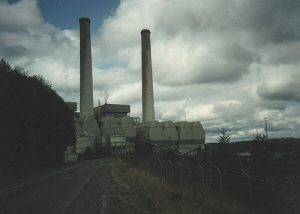
I finally had a chance tonight to listen to the “TED Radio Hour” episode on the “Anthropocene”. This is the name given by some in the climate science community to the epoch of time in which we now live. The Holocene, which began about 11,000 ago when the glaciers of the last ice age receded, had been the period in which we lived. The climate had been relatively stable and generally cool and pleasant. But our species’ strong ability to adapt, evolve technologically, and reshape the world has likely shifted the Earth from that period into a new one. Our consumption of fossil fuels has resulted in a shifting climate that warms more every decade. The last time this kind of warming occurred and was not checked, 90% of all life on Earth was driven to extinction in an event our species named “The Great Dying.”
The “TED Radio Hour” is an often-informative and thoughtful show that chooses a theme each week and explores the theme from the perspective of people who have delivered TED talks on the subject. TED – “Technology, Education, Design” – is a main conference and a vast constellation of satellite conferences that encourage the audience to learn about a lot of subjects in a shallow way in a very short time. Typically, TED talks last just 10-15 minutes and the topics can shift wildly from talk to talk. It’s a fun way to sample across a vast array of ideas and subjects, from street art to dying to particle physics.
In a recent episode, the TED Radio Hour explored the age in which humans now live, an age fashioned by our choices. The name given to this era is “Anthropocene,” referring to the human-centered nature of it. Modern humans have only been on the Earth for 200,000 years, and only developed things like writing in the last few thousands of years. We’ve also learned to use the resources around us to create energy, at first perhaps to keep animals at bay or cook food, but now to power our whole civilization. Choices have consequences. The choice to use so much long-buried “fossil fuels,” rich in energy but at the cost of creating huge quantities of carbon compounds that now flood the atmosphere and ocean, has led to the present warming state of the planet and a shift in climate that, along with our reshaping of the land, is altering the varieties of plants and animals on the planet.
The last time a lot of coal was burned in a short period of time, it was volcanoes doing the burning of vast coal deposits. This warmed the planet, shut down the global ocean currents, which starved the oceans of oxygen (killing vast quantities of sea life), which led to the thriving of certain bacteria that emit hydrogen sulfide gas, which flooded the land (killing vast quantities of land life). This mass extinction was the closest life came in 3.5 billion years to being totally wiped out; 90% of all species were lost. This was the Permian Extinction.
Now, humans burn vast amounts of coal… and oil… and natural gas… and we have begun a rapid warming trend by taking carbon-dioxide, a potent greenhouse gas, from 280 parts-per-million in the atmosphere around the time of the industrial revolution to over 400 ppm now. This has increased the amount of water vapor in the air, and other practices have contributed methane to the air. These two are highly potent heat-trapping gases, acting to amplify the warming that was leveraged by CO2.
And now President-Elect Trump, in a misguided attempt to “restore jobs” that, he claimed, were lost to regulation (they were not – they were lost to competition with other fossil fuels), has stated he wants to restore coal mining jobs and burn more coal. He’s put a science denier in charge of the transition team for his environmental policy efforts. All signs point to a President who aims to hasten the Anthropocene along.
So it’s important to learn what this means. What does it mean to be the cause of the present state of the surface of a planet? What consequences does this have for us and other life? Can we adapt to our own changes? If not, what happens next? What was the Permian Extinction, and could it happen a second time?
You can explore all of this in the TED Radio Hour on the “Anthropocene”:


